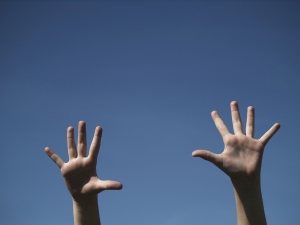Bow, stubborn knee — Shakespeare
I walked into an old church downtown yesterday. Its edifice was old and craggy, its stones walls worn by a century of wind, pelting snow and acid rain. I walked through its medieval-like doors, the smell of melted wax, a dollop of frankincense and recently fallen snow wrapped around my newly chapped face.
No one was there. I sat in a well-worn pew near the front. I looked up at the vaulted ceiling full of stars, angels and saints. I thought of the tens of thousands of souls over the past hundred or so years that had worshipped here, sought answers and sought peace. Now here I was.
A conundrum of faith is that we never really know. That’s why we must rely on faith, I guess. It seems like we’re given just enough light to see our next footstep in life, but never full illumination to see the entire journey ahead of us. It’s not reason to despair; it is reason to feel humble before the mysterious grandeur of all we don’t know.
It’s okay to have doubts. One of Jesus’ disciples, a guy aptly known as “Doubting Thomas,” had his for sure. But the opposite of faith isn’t doubt – it is fear. We’re all on some kind of existential thin ice wondering if and when it’s going to crack and our lives fall apart. It isn’t odd or strange to feel this way. It’s part of the human condition.
Henri Nouwen wrote:
“As we look at the starts and let our minds wander into the many galaxies, we come to feel so small and insignificant that anything we do, say, or think seems completely useless. But if we look into our souls and let our minds wander into the endless galaxies of our interior lives, we become so tall and significant that everything we do, say, or think appears to be of great importance.”
We have to keep looking both ways to remain humble and confident, humorous and serious, playful and responsible. Yes, the human being is very small and very tall. It is the tension between the two that keeps us spiritually awake.
I think real faith, is humble faith. To be otherwise is great hubris; a belief in one’s certitude to the exclusion of others.
Sister Joan Chittister writes:
“The opposite of humility is arrogance, something we are all guilty of at one time or another. Arrogance corrodes our awareness of the power of interdependence and leaves us to die incomplete. It reduces the creation of others to dust. It makes it impossible for us even to see our own knees.”
Many, many people around the world – good folks – have no one, are alone or are living under very difficult circumstances. They are the poor, both in body, spirit or material goods. A man seeking a donation in Charles Dickens A Christmas Carol, says to the grouchy crank:
“At this festive season of the year, Mr. Scrooge,” said the gentleman, taking up a pen, “it is more than usually desirable that we should make some slight provision for the poor and destitute, who suffer greatly at the present time. … We choose this time, because it is a time, of all others, when Want is keenly felt, and Abundance rejoices.”
We should feel humble before such a reality; cognizant of all the blessings we’ve been given and maybe determined, perhaps for the first time in a while, to share our blessings with others in want as we speed toward the New Year.
The bible is usually tough for me to read. I don’t get a lot of the historical facts and how they play into what I am supposed to learn from the teachings. Maybe it’s in admitting that I don’t really know much that I become more open to everything. The Zen call it “beginner’s mind;” a state where we let go and empty ourselves of ourselves. There is something authentic in our coming to life on our knees rather than our heads that try to figure everything out. As U2’s Bono wailed, “If you want to kiss the sky you’d better learn how to kneel.”
It’s when I meet real people who have lived these words that I feel a greater sense of the reality of the in the bible – it’s the reality of word made flesh. That was the whole point about Jesus, wasn’t it? It wasn’t enough for God to send prophets with plumes of grey hair firing out of their heads and scary wooden staffs. No. God had to crank up the volume loud enough so we could hear. And the message was intimate and personal. He sent Jesus into our troubled world so “. . . that the people who walked in darkness [could] see a great light.”
In my own brokenness, sometimes I listen too closely to the voice of depression; the sad parrot on my shoulder that tells me I will always feel crummy and never really feel good about myself. Then I think about that part in the bible where Jesus says to one of his followers, “Who do you say I am?” The disciple replies that he is the Christ, the savior. Similarly, I think we can all ask Jesus “Who do you say I am?” The response is surely not the one depression would con us into believing. It’s a loving and authentic voice, one that says we are cherished and belong.
Jesus’ birth was a humble birth, indeed. As Thomas Merton once wrote, “There were only a few shepherds at the first Bethlehem. The ox and the donkey understood more of the first Christmas than the high priests in Jerusalem. And it is the same today.”
Sister Joan writes again:
“It is our need for one another that teaches us our need for God. It is our down-deep incompleteness that cries out all the days of our lives to be complete – by those around us, by God. We must pray for the humility it takes to find our wholeness in our littleness.”
Beyond the gifts, the feasts and the holly and the ivy, remember to be humble. It is this humility, this lack of ego that allows us to be part of the healing mysteries at Christmas time.
As for me, I’ll sit around my Yuletide table. And after the turkey and mashed potatoes, eat some humble pie.



















